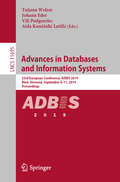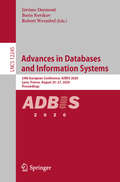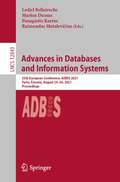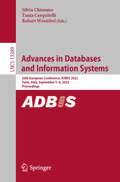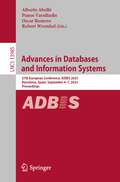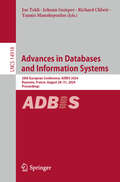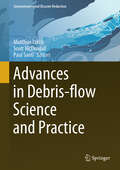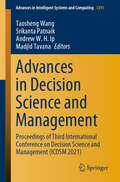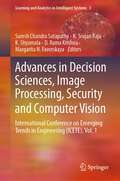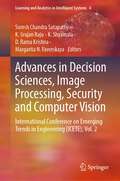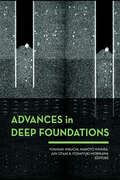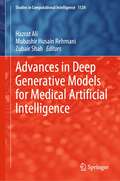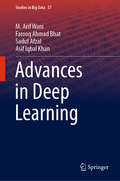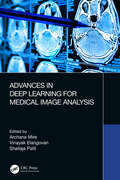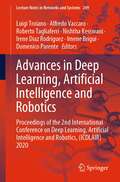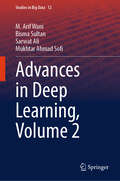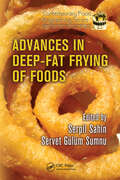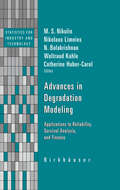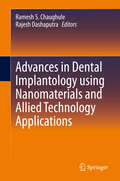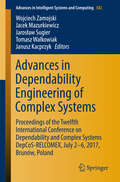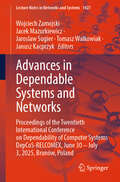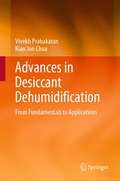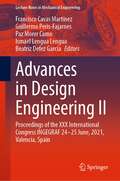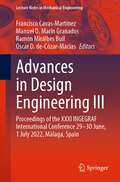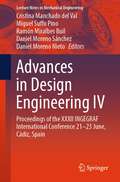- Table View
- List View
Advances in Databases and Information Systems: 23rd European Conference, ADBIS 2019, Bled, Slovenia, September 8–11, 2019, Proceedings (Lecture Notes in Computer Science #11695)
by Tatjana Welzer Johann Eder Vili Podgorelec Aida Kamišalić LatifićThis book constitutes the proceedings of the 23rd European Conference on Advances in Databases and Information Systems, ADBIS 2019, held in Bled, Slovenia, in September 2019.The 27 full papers presented were carefully reviewed and selected from 103 submissions. The papers cover a wide range of topics from different areas of research in database and information systems technologies and their advanced applications from theoretical foundations to optimizing index structures. They focus on data mining and machine learning, data warehouses and big data technologies, semantic data processing, and data modeling. They are organized in the following topical sections: data mining; machine learning; document and text databases; big data; novel applications; ontologies and knowledge management; process mining and stream processing; data quality; optimization; theoretical foundation and new requirements; and data warehouses.
Advances in Databases and Information Systems: 24th European Conference, ADBIS 2020, Lyon, France, August 25–27, 2020, Proceedings (Lecture Notes in Computer Science #12245)
by Robert Wrembel Jérôme Darmont Boris NovikovThis book constitutes the proceedings of the 24th European Conference on Advances in Databases and Information Systems, ADBIS 2020, held in Lyon, France, in August 2020.* The 13 full papers presented were carefully reviewed and selected from 82 submissions. The papers cover a wide range of topics from different areas of research in database and information systems technologies and their advanced applications from theoretical foundations to optimizing index structures. They are organized in the following topical sections: keynote extended abstracts; data access and database performance; machine learning; semantic web; data processing; and data analytics. * The conference was held virtually due to the COVID-19 pandemic.
Advances in Databases and Information Systems: 25th European Conference, ADBIS 2021, Tartu, Estonia, August 24–26, 2021, Proceedings (Lecture Notes in Computer Science #12843)
by Ladjel Bellatreche Raimundas Matulevičius Marlon Dumas Panagiotis KarrasThis book constitutes the proceedings of the 25th European Conference on Advances in Databases and Information Systems, ADBIS 2021, held in Tartu, Estonia, in August 2021. The 18 full papers presented together with 3 keynotes were carefully reviewed and selected from 70 submissions. The selected papers span a wide spectrum of topics in databases and related technologies, tackling challenging problems and presenting inventive and efficient solutions. They are organized in 5 sessions: patterns and events, social media and text mining, indexes, queries and constraints, high-dimensional data and data streams, and data integration.
Advances in Databases and Information Systems: 26th European Conference, ADBIS 2022, Turin, Italy, September 5–8, 2022, Proceedings (Lecture Notes in Computer Science #13389)
by Tania Cerquitelli Robert Wrembel Silvia ChiusanoThis book constitutes the proceedings of the 26th European Conference on Advances in Databases and Information Systems, ADBIS 2022, held in Turin, Italy, in September 2022.The 23 full papers presented together with 5 keynote and tutorial papers were carefully reviewed and selected from 90 submissions. The papers are organized in the following topical sections: keynote talk and tutorials; graph processing; time series and data streams; on line analytical processing; advanced querying; performance; machine learning; data science methods.
Advances in Databases and Information Systems: 27th European Conference, ADBIS 2023, Barcelona, Spain, September 4–7, 2023, Proceedings (Lecture Notes in Computer Science #13985)
by Alberto Abelló Robert Wrembel Oscar Romero Panos VassiliadisThis book constitutes the proceedings of the 27th European Conference on Advances in Databases and Information Systems, ADBIS 2023, held in Barcelona, Spain, during September 4–7, 2023. The 11 full papers presented in this book together with 3 keynotes and tutorials were carefully reviewed and selected from 77 submissions. The papers are organized in the following topical sections: keynote talk and tutorials; query processing and data exploration, data science and fairness and Data and Metadata Quality
Advances in Databases and Information Systems: 28th European Conference, ADBIS 2024, Bayonne, France, August 28–31, 2024, Proceedings (Lecture Notes in Computer Science #14918)
by Richard Chbeir Yannis Manolopoulos Johann Gamper Joe TekliThis volume LNCS 14918 constitutes the refereed proceedings of 28th European Conference, ADBIS 2024, held in Bayonne, France, during August 28-31, 2024. The 15 full papers presented were carefully reviewed and selected from 43 submissions. The conference focuses on Algebra, Models, Schemata, Discovery and Data Analysis, Algorithms and Optimization, Access Methods and Query Processing, Advanced Architectures, Machine Learning, Large Language Models.
Advances in Debris-flow Science and Practice (Geoenvironmental Disaster Reduction)
by Matthias Jakob Scott McDougall Paul SantiThis book provides a summary of the state of the art of all facets of debris-flow science and practice and is designed to be a comprehensive technical reference for practitioners and a state-of-the-art research overview for scientists. It is richly illustrated with equations, graphs, photos, and tables. The book allows students, practitioners, and regulators to get a sense of the current state of the art in this science. Currently, there are 2 to 3 papers published every week on some aspects of debris-flow science. This creates a bewildering amount of literature that cannot be captured by a single individual. This book provides a comprehensive overview of all facets to date, including initial hazard assessments, detailed quantitative risk assessments, debris-flow warning systems, debris-flow mitigation structure designs, and failures of mitigation works, as well as new topics such as climate change effects on debris flows.
Advances in Decision Science and Management: Proceedings of Third International Conference on Decision Science and Management (ICDSM 2021) (Advances in Intelligent Systems and Computing #1391)
by Madjid Tavana Srikanta Patnaik Andrew W. H. Ip Taosheng WangThis book discusses an emerging area in computer science, IT, and management, i.e., decision sciences and management. It includes studies that employ various computing techniques like machine learning to generate insights from huge amounts of available data; and which explore decision making for cross-platforms that contain heterogeneous data associated with complex assets; leadership; and team coordination. It also reveals the advantages of using decision sciences with management-oriented problems. The book includes a selection of the best papers presented at the Third International Conference on Decision Science and Management 2021 (ICDSM 2021), held at Hang Seng University of Hong Kong in China.
Advances in Decision Sciences, Image Processing, Security and Computer Vision: International Conference on Emerging Trends in Engineering (ICETE), Vol. 1 (Learning and Analytics in Intelligent Systems #3)
by Margarita N. Favorskaya Suresh Chandra Satapathy K. Srujan Raju K. Shyamala D. Rama KrishnaThis book constitutes the proceedings of the First International Conference on Emerging Trends in Engineering (ICETE), held at University College of Engineering and organised by the Alumni Association, University College of Engineering, Osmania University, in Hyderabad, India on 22–23 March 2019.The proceedings of the ICETE are published in three volumes, covering seven areas: Biomedical, Civil, Computer Science, Electrical & Electronics, Electronics & Communication, Mechanical, and Mining Engineering. The 215 peer-reviewed papers from around the globe present the latest state-of-the-art research, and are useful to postgraduate students, researchers, academics and industry engineers working in the respective fields. Volume 1 presents papers on the theme “Advances in Decision Sciences, Image Processing, Security and Computer Vision – International Conference on Emerging Trends in Engineering (ICETE)”. It includes state-of-the-art technical contributions in the area of biomedical and computer science engineering, discussing sustainable developments in the field, such as instrumentation and innovation, signal and image processing, Internet of Things, cryptography and network security, data mining and machine learning.
Advances in Decision Sciences, Image Processing, Security and Computer Vision: International Conference on Emerging Trends in Engineering (ICETE), Vol. 2 (Learning and Analytics in Intelligent Systems #4)
by Margarita N. Favorskaya Suresh Chandra Satapathy K. Srujan Raju K. Shyamala D. Rama KrishnaThis book constitutes the proceedings of the First International Conference on Emerging Trends in Engineering (ICETE), held at University College of Engineering and organised by the Alumni Association, University College of Engineering, Osmania University, in Hyderabad, India on 22–23 March 2019. The proceedings of the ICETE are published in three volumes, covering seven areas: Biomedical, Civil, Computer Science, Electrical & Electronics, Electronics & Communication, Mechanical, and Mining Engineering. The 215 peer-reviewed papers from around the globe present the latest state-of-the-art research, and are useful to postgraduate students, researchers, academics and industry engineers working in the respective fields. Volume 2 presents papers on the theme “Advances in Decision Sciences, Image Processing, Security and Computer Vision – International Conference on Emerging Trends in Engineering (ICETE)”. It includes state-of-the-art technical contributions in the areas of electronics and communication engineering and electrical and electronics engineering, discussing the latest sustainable developments in fields such as signal processing and communications; GNSS and VLSI; microwaves and antennas; signal, speech and image processing; power systems; and power electronics.
Advances in Deep Foundations: International Workshop on Recent Advances of Deep Foundations (IWDPF07) 1-2 February 2007, Port and Airport Research Institute, Yokosuka, Japan
by Jun Otani Yoshiaki Kikuchi Makoto KimuraCivil Engineering has recently seen enormous progress in the core field of the construction of deep foundations. This book is the result of the International Workshop on Recent Advances in Deep Foundations (IWDPF07), which was held in Yokosuka, Japan from the 1st to the 2nd of February, 2007. Topics under discussion in this book include recent rese
Advances in Deep Generative Models for Medical Artificial Intelligence (Studies in Computational Intelligence #1124)
by Mubashir Husain Rehmani Hazrat Ali Zubair ShahGenerative Artificial Intelligence is rapidly advancing with many state-of-the-art performances on computer vision, speech processing, and natural language processing tasks. Generative adversarial networks and neural diffusion models can generate high-quality synthetic images of human faces, artworks, and coherent essays on different topics. Generative models are also transforming Medical Artificial Intelligence, given their potential to learn complex features from medical imaging and healthcare data. Hence, computer-aided diagnosis and healthcare are benefiting from Medical Artificial Intelligence and Generative Artificial Intelligence. This book presents the recent advances in generative models for Medical Artificial Intelligence. It covers many applications of generative models for medical image data, including volumetric medical image segmentation, data augmentation, MRI reconstruction, and modeling of spatiotemporal medical data. This book highlights the recent advancements in Generative Artificial Intelligence for medical and healthcare applications, using medical imaging and clinical and electronic health records data. Furthermore, the book comprehensively presents the concepts and applications of deep learning-based artificial intelligence methods, such as generative adversarial networks, convolutional neural networks, and vision transformers. It also presents a quantitative and qualitative analysis of data augmentation and synthesis performances of Generative Artificial Intelligence models. This book is the result of the collaborative efforts and hard work of many minds who contributed to it and illuminated the vast landscape of Medical Artificial Intelligence. The book is suitable for reading by computer science researchers, medical professionals, healthcare informatics, and medical imaging researchers interested in understanding the potential of artificial intelligence in healthcare. It serves as a compass for navigating the artificial intelligence-driven healthcare landscape.
Advances in Deep Learning (Studies in Big Data #57)
by M. Arif Wani Farooq Ahmad Bhat Saduf Afzal Asif Iqbal KhanThis book introduces readers to both basic and advanced concepts in deep network models. It covers state-of-the-art deep architectures that many researchers are currently using to overcome the limitations of the traditional artificial neural networks. Various deep architecture models and their components are discussed in detail, and subsequently illustrated by algorithms and selected applications. In addition, the book explains in detail the transfer learning approach for faster training of deep models; the approach is also demonstrated on large volumes of fingerprint and face image datasets. In closing, it discusses the unique set of problems and challenges associated with these models.
Advances in Deep Learning for Medical Image Analysis
by Archana MireThis reference text introduces the classical probabilistic model, deep learning, and big data techniques for improving medical imaging and detecting various diseases. The text addresses a wide variety of application areas in medical imaging where deep learning techniques provide solutions with lesser human intervention and reduced time. It comprehensively covers important machine learning for signal analysis, deep learning techniques for cancer detection, diabetic cases, skin image analysis, Alzheimer’s disease detection, coronary disease detection, medical image forensic, fetal anomaly detection, and plant phytology. The text will serve as a useful text for graduate students and academic researchers in the fields of electronics engineering, computer science, biomedical engineering, and electrical engineering.
Advances in Deep Learning, Artificial Intelligence and Robotics: Proceedings of the 2nd International Conference on Deep Learning, Artificial Intelligence and Robotics, (ICDLAIR) 2020 (Lecture Notes in Networks and Systems #249)
by Alfredo Vaccaro Roberto Tagliaferri Luigi Troiano Nishtha Kesswani Irene Díaz Rodriguez Imene Brigui Domenico ParenteThis book of Advances in Deep Learning, Artificial Intelligence and Robotics (proceedings of ICDLAIR 2020) is intended to be used as a reference by students and researchers who collect scientific and technical contributions with respect to models, tools, technologies and applications in the field of modern artificial intelligence and robotics. Deep Learning, AI and robotics represent key ingredients for the 4th Industrial Revolution. Their extensive application is dramatically changing products and services, with a large impact on labour, economy and society at all. The research and reports of new technologies and applications in DL, AI and robotics like biometric recognition systems, medical diagnosis, industries, telecommunications, AI petri nets model-based diagnosis, gaming, stock trading, intelligent aerospace systems, robot control and web intelligence aim to bridge the gap between these non-coherent disciplines of knowledge and fosters unified development in next-generation computational models for machine intelligence.
Advances in Deep Learning, Volume 2 (Studies in Big Data #12)
by M. Arif Wani Bisma Sultan Sarwat Ali Mukhtar Ahmad SofiThis book describes novel ways of using deep learning to solve real-world problems. It covers advanced deep learning topics like neural architecture search, ensemble deep learning, transfer learning techniques, lightweight architectures, hybrid deep learning approaches, and generative adversarial networks. The book discusses the use of these advanced topics in selected applications like image classification, object detection, image steganography, protein secondary structure prediction, and gene expression data classification. Various challenges and future research directions falling under the scope of these topics are discussed.
Advances in Deep-Fat Frying of Foods (Contemporary Food Engineering)
by Serpil Sahin Servet Gülüm SumnuBattered fried foods consistently remain in high demand despite concerns about their health aspects, prompting food processors to develop new methods and alternative oils and batters in the name of healthy, tasty fried foods and high-performance, cost-effective frying oil. With contributions from an international panel of food technology authoritie
Advances in Degradation Modeling: Applications to Reliability, Survival Analysis, and Finance (Statistics for Industry and Technology)
by Nikolaos Limnios Waltraud Kahle N. Balakrishnan Catherine Huber-Carol M. S. NikulinThis volume is a collection of invited chapters covering recent advances in accelerated life testing and degradation models. The book covers a wide range of applications to areas such as reliability, quality control, the health sciences, economics and finance. It is an excellent reference for researchers and practitioners in applied probability and statistics, industrial statistics, the health sciences, quality control, economics, and finance.
Advances in Dental Implantology using Nanomaterials and Allied Technology Applications
by Ramesh S. Chaughule Rajesh DashaputraAs the name suggests this book discusses how nanotechnology has influenced the provision of implant treatment from surgery to prosthetic reconstruction and post treatment biological complications. This book is a sequel to the earlier book “Dental Applications of Nanotechnology” published by Springer. It aims to present both the nanotechnology and allied research along with the clinical concepts of almost every different aspect of implantology in one volume. These two fraternities promote the translation of the research ideas and product development into fruitful practicalities. The first section covers nanobiomaterials in implant applications, in bone regeneration, prosthetic rehabilitation, to control biofilm and peri-implantitis, bone grafting and tissue engineering. The second section explores applications of such new technologies in the field of implantology that gives this book a unique feature by bringing science and technology into clinical application. It covers implant stability, peri-implantitis, lasers, CAD/CAM technology, impressions, 3D printing, reconstruction with bone grafts and zygomatic implants. Comprehensive coverage includes both simple and complicated clinical cases, with practical guidance on how to apply the latest research, diagnostic tools, treatment planning, implant designs, materials, and techniques to provide superior patient outcomes. The book is well written and structured making it easy for experienced clinicians and those new to dental implantology as well as students, researchers, scientists and faculties of dental universities
Advances in Dependability Engineering of Complex Systems: Proceedings of the Twelfth International Conference on Dependability and Complex Systems DepCoS-RELCOMEX, July 2 - 6, 2017, Brunów, Poland (Advances in Intelligent Systems and Computing #582)
by Janusz Kacprzyk Wojciech Zamojski Jacek Mazurkiewicz Jarosław Sugier Tomasz WalkowiakThese proceedings present the results of the Eleventh International Conference on Dependability and Complex Systems DepCoS-RELCOMEX which took place in a picturesque Brun#65533;w Palace in Poland from 27th June to 1st July, 2016. DepCoS-RELCOMEX is a series of international conferences organized annually by Department of Computer Engineering of Wrocław University of Science and Technology since 2006. The roots of the series go as far back as to the seventies of the previous century - the first RELCOMEX conference took place in 1977 - and now its main aim is to promote a multi-disciplinary approach to dependability problems in theory and engineering practice of complex systems. Complex systems, nowadays most often computer-based and distributed, are built upon a variety of technical, information, software and human resources. The challenges in their design, analysis and maintenance not only originate from the involved technical and organizational structures but also from the complexity of the information processes that must be efficiently executed in a diverse, often hostile operational environment. Traditional methods of reliability evaluation focused only on technical resources are usually insufficient in this context and more innovative, multidisciplinary methods of dependability analysis must be applied. The diversity of the topics which need to be considered is well illustrated by the selection of the submissions in these proceedings with their subjects ranging from mathematical models and design methodologies through software engineering and data security issues up to practical problems in technical, e. g. transportation, systems.
Advances in Dependable Systems and Networks: Proceedings of the Twentieth International Conference on Dependability of Computer Systems DepCoS-RELCOMEX, June 30 – July 3, 2025, Brunów, Poland (Lecture Notes in Networks and Systems #1427)
by Janusz Kacprzyk Wojciech Zamojski Jacek Mazurkiewicz Tomasz Walkowiak Jaroslaw SugierThis book presents the proceedings of the Twentieth International Conference on Dependability of Computer Systems, showcasing recent advancements in this broad area. Contemporary computer systems and networks are the most complex structures ever engineered by man yet their reliable operation is paramount in today&’s interconnected world. These systems form the backbone of almost every sector, from healthcare and finance to communication and transportation. Dependable systems ensure the seamless functioning of critical services, such as medical diagnostics, financial transactions, and emergency responses. This volume offers a selection of papers addressing challenges encountered in dependability studies of such systems. It can serve as an engaging and thought-provoking resource for scientists, researchers, engineers, and students who must tackle diverse dependability considerations in the design, analysis, or maintenance of contemporary computer systems. The 20th DepCoS-RELCOMEX conference marked yet another installment in a series of events held annually since 2006. Initially conceived as a platform for scholarly dialogue on reliability in computer engineering, the conference's focus has continually evolved to encompass emerging challenges arising from advancements in information technologies and computer engineering. Today, dependable computer operations involve delivering accurate and timely results while process
Advances in Desiccant Dehumidification: From Fundamentals to Applications
by Vivekh Prabakaran Kian Jon ChuaThis book systematically analyses state-of-the-art technology and research related to desiccant dehumidification. It provides key insights into the current research direction, and presents global research and development interests. It begins by offering a comprehensive review of conventional desiccants and their underlying engineering challenges. Fundamental material characteristic properties and factors critical to the desiccant synthesis are highlighted.The applicability of next-generation advanced materials to address the challenges is documented, and the advantages of desiccant coated heat exchangers are evaluated. Lastly, the potential applications of desiccant dehumidifiers in various energy-connected applications are discussed, and case studies on industrial/building cooling systems are provided. Specifically targeted at HVAC engineers, thermal scientists, energy-engineering researchers, and graduate-level students in the field, the technical content balances fundamental concepts and applications.
Advances in Design Engineering II: Proceedings of the XXX International Congress INGEGRAF, 24-25 June, 2021, Valencia, Spain (Lecture Notes in Mechanical Engineering)
by Guillermo Peris-Fajarnes Paz Morer Camo Francisco Cavas Martínez Ismael Lengua Lengua Beatriz Defez GarcíaThis book contains the papers presented at the XXX International Congress INGEGRAF, “Digital Engineering, its application in Research, Development and Innovation”, held on 24–25 June 2021 in Valencia, Spain.The book reports on cutting-edge topics in product design and manufacturing, such as industrial methods for integrated product and process design; innovative design; and computer-aided design. Further topics covered include virtual simulation and reverse engineering; additive manufacturing; product manufacturing; engineering methods in medicine and education; representation techniques; and nautical, engineering and construction, aeronautics and aerospace design and modeling. The book has six sections, reflecting the focus and primary themes of the conference. The contributions presented here will not only provide researchers, engineers, and experts in a range of industrial engineering subfields with extensive information to support their daily work; but also they are intended to stimulate new research directions, advanced applications of the methods discussed, and future interdisciplinary collaborations.
Advances in Design Engineering III: Proceedings of the XXXI INGEGRAF International Conference 29–30 June, 1 July 2022, Málaga, Spain (Lecture Notes in Mechanical Engineering)
by Francisco Cavas-Martínez Ramón Mirálbes Buil Manuel D. Marín Granados Oscar D. de-Cózar-MacíasThis book contains the papers presented at the XXXI International Congress INGEGRAF “Graphic Expression: reunion, reflection, representation,” held on June 29–30 and July 1, 2021, in Málaga, Spain. It reports on cutting-edge topics in product design and manufacturing, such as industrial methods for integrated product and process design, innovative design and computer-aided design. Further topics covered include virtual simulation and reverse engineering, additive manufacturing, product manufacturing,engineering methods in medicine and education, representation techniques and nautical, engineering and construction, aeronautics and aerospace design and modeling. The book is divided into six main sections, reflecting the focus and primary themes of the conference. The contributions presented here provide researchers, engineers and experts in a range of industrial engineering subfields with extensive information to support their daily work; but also they are intended to stimulate new research directions, advanced applications of the methods discussed and future interdisciplinary collaborations.
Advances in Design Engineering IV: Proceedings of the XXXII INGEGRAF International Conference 21–23 June, Cádiz, Spain (Lecture Notes in Mechanical Engineering)
by Cristina Manchado del Val Miguel Suffo Pino Ramón Miralbes Buil Daniel Moreno Sánchez Daniel Moreno NietoThis book presents the cutting-edge research showcased at the XXXII International Congress INGEGRAF, held in Cádiz, Spain from 21-23 June 2023. It highlights the latest advances in product design and manufacturing, including industrial methods for integrated product and process design, innovative design, and computer-aided design. The book covers a broad spectrum of topics, including virtual simulation and reverse engineering, additive manufacturing, product manufacturing, engineering methods in medicine and education, representation techniques, and nautical, engineering and construction, aeronautics and aerospace design, and modeling.The book is organized into main sections that reflect the focus and primary themes of the conference. The contributions in this book provide extensive information and insights to support the daily work of researchers, engineers, and experts in various industrial engineering subfields. Additionally, the book intends to inspire new research directions, promote advanced applications of the discussed methods, and foster future interdisciplinary collaborations.
